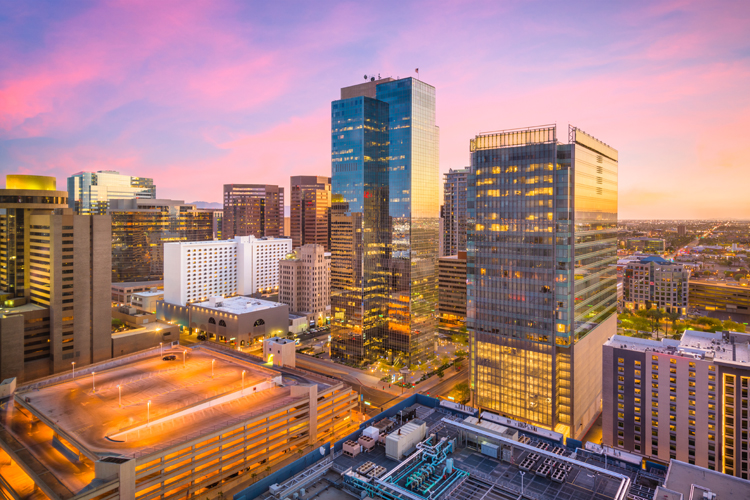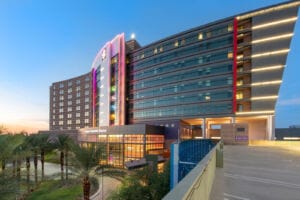The numbers are staggering.
In its just over 30 years of existence, the Greater Phoenix Economic Council (GPEC) has helped more than 800 companies set up business in Arizona, helped bring more than 144,000 jobs to the state, and attracted more than $16.1 billion in capital investment to the region.
“(GPEC President and CEO) Chris Camacho and his team consistently lead the nation in net absorption and retention figures due to their strategy, consistency and tenacity in identifying and targeting domestic and international end users to choose the Valley of the Sun as a place to select for their business destination,” says James Murphy, president and CEO of Willmeng Construction and long-standing GPEC member. “GPEC represents Arizona at the highest level to make the business case that Arizona is the right choice for the long-term success of the prospect. This business case spans from the cost of the KW-hour for power, the availability of water, pipeline of qualified labor, ability to expand, distribution logistics, incentives, and multiple tiers of a comprehensive tax discussion.”
With GPEC’s success in attracting and growing companies has come explosive growth — both economically and in the sheer number of people. From July 2017 to July 2018, Greater Phoenix welcomed 62,000 new residents, the most of any metropolitan area in the United States during those 12 months.
While the population is shifting and evolving, so is the reputation of the Valley. Although Greater Phoenix has been touted to outside markets for its great weather and strong real estate market, the region is becoming a destination for emerging technologies, including autonomous vehicles, cybersecurity, medical technology, blockchain, artificial intelligence, the Internet of Things (IoT) and wearable technology.
“We’ve really bet on the right things and we’ve put a lot of infrastructure, data analytics and data sciences into our efforts,” Camacho says, “so we are speaking the language that top global companies are speaking today. That puts us in a position to win a lot of deals.”
10 big wins for GPEC
And winning deals is something GPEC is doing with great skill. In a year packed with significant economic development successes across a variety of industries, here are 10 game-changers that GPEC helped lock down last year:
Infosys: The global digital services and consulting firm is building a technology and innovation center in ASU’s Novus Innovation Corridor south of Tempe Town Lake. Infosys has pledged to add a total of 1,000 jobs in Arizona by 2023.
Deloitte: Experts at the company’s 102,000-square-foot U.S. Delivery Center in Gilbert will develop and implement emerging technology solutions for a range of private and public sector clients. The center is expected to generate 2,500 jobs for the region.
Front: The Sequoia-backed, high-growth tech company that is replacing corporate email with an inbox built for teamwork, will create up to 50 new jobs in Greater Phoenix in 2020, its inaugural year in the region.
Nike: The iconic company is making a significant manufacturing investment in its U.S. innovation footprint by opening a new Nike Air Manufacturing Innovation facility in Goodyear, which is expected to generate more than 500 full-time jobs and result in an investment of at least $184 million.
Red Bull, Ball Corporation and Rauch Fruit Juices: The three companies have partnered to create a new West Valley manufacturing hub south of Peoria Avenue near Loop 303. Red Bull and Rauch cans will be filled in the 700,000-square-foot building, which is set to open in the first quarter of 2021.
Silicon Valley Bank: The bank of the world’s most innovative companies has secured an additional 60,000 square feet of office space in Tempe that it will move into this year and aims to grow its presence by more than 300 employees in the next three years.
Verdigris: The company bringing banking to the unbanked selected Arizona for its corporate headquarters and will bring more than 210 well-compensated jobs to the Greater Phoenix area with average annual salaries of more than $150,000.
Creighton University: The school is building a new, nearly $100 million health sciences campus at Park Central in midtown Phoenix. The campus eventually will house nearly 800 Creighton health sciences students in Arizona.
Zillow: The company’s new Greater Phoenix office acts as the Southwest hub for Zillow Offers, which is transforming the process of selling a home by giving sellers a free, no-obligation cash offer. Zillow Group expected to add 160 employees by the end of 2019.
Microsoft: The tech giant is building three new “world-class” data center campuses in El Mirage and Goodyear. The project will create 110 new jobs for mechanical engineers, electrical engineers, data center technicians and more. There will also be more than 1,000 construction jobs created to build these three data centers.
“In terms of the industries in which I foresee growth in Metro Phoenix, we will see massive technology growth — both through consolidation from higher-cost markets pushing out some of the higher-growth companies, and we will also see organic growth in technology companies from new ventures that are being launched,” Camacho says. “You’re going to see technology companies getting to scale in Arizona, which is very exciting. Ideally, in the next decade, we will see another homegrown company like Carvana or Keap get to scale and go public.”




